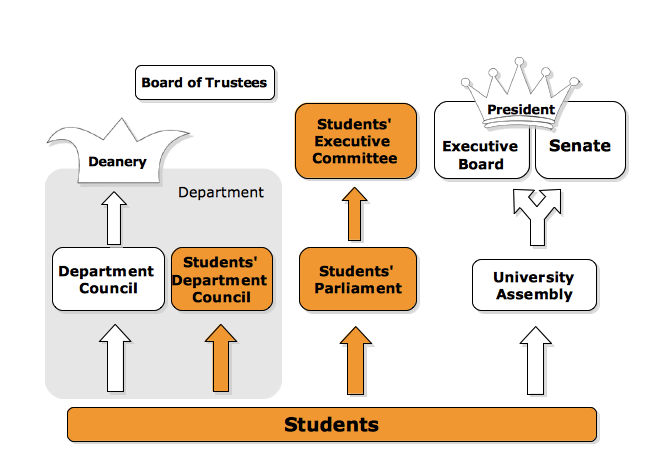At TU Darmstadt, there are various committees that are elected through the annual university elections. In the academic self-administration (Fachbereichsrat/Department Council – FBR, Universitätsversammlung/University assembly – UV), the four status groups meet to decide upon principles and the day-to-day business of the university and the department. In addition to the students as the largest status group and the professors, there are the academic and administrative-technical staff (WiMi and ATM).
As an independent organisation and part of the university, the student body plays a central role. The student self-administration bodies (Fachschaftsrat/Students‘ Department Council– FSR, Student parliament – StuPa) are elected at the departmental level as well as at the university level.

Committees of the Faculty (FB)
It is a personal election in which the number of votes corresponds to the number of seats to be filled.
Students‘ Department Council (FSR): the active student body
The departmental student councils perform tasks at the university in a variety of ways. They represent the interests of the students in their department.
This usually includes the organisational supervision of a learning centre in the department, advising on questions about studying, regular student council meetings to exchange information about what is happening in the department, organising the orientation week and much more. The list is long and varies from student council to student council.
Department Council (FBR)
3 or 5 students are elected to the department’s highest decision-making body, depending on the number of students at the department.
In monthly meetings, the departmental council deals with matters of fundamental importance to the department and elects the dean’s office. Among other things, it decides on study and examination regulations and appointments. The FBR also decides on the use of funds allocated to the department.
Committees of the University
Members are elected to the central committees via a list election.One vote is allocated for each UV and StuPa.
Student Parliament (StuPa)
The student parliament of the TU Darmstadt is the highest body of the student body. It consists of 31 students and is responsible, among other things, for the election and deselection of the General Student Committee (AStA) and the budget of the student body. Meetings are held monthly during the lecture period.
This is where decisions are made on what to do with the share of the semester contribution to the student body (11.50 €).
Students‘ Executive Commitee (AStA)
The StuPa elects the General Student Committee (AStA). It represents the political, cultural and social interests of all students at the TU Darmstadt. It administers the student body’s budget and thus also the funds of the student councils. It offers a wide range of advice and services in the AStA offices and through the numerous voluntary departments.
The student businesses also belong to the AStA: 806qm, Schlosskeller, Schlossgarten, AStA-Papierladen and the self-help bicycle workshop zwanzig°.
University Assembly (UV)
15 students are elected. The University Assembly with its 61 members does not exist at all universities. It is enshrined in the TUD Act, which extends the Hessian Higher Education Act (HHG).The UV determines the principles of the TU. These include opinions, in particular on fundamental issues concerning the development of the university, teaching and studies and young academics, as well as the election of a president and vice-presidents.In spring 2019 President Dr. Tanja Brühl was elected by the UV for a 6 years.
Senate
The senators (4 students) are elected at the UV. In the monthly meetings, the day-to-day fate of the TU is discussed and decided. The Senate decides on the budget, building plans, study regulations, appointments of professors and central research issues. It supervises the work of the Presidential Board.
Student Council Conference (FSK)
The Student Council Conference is a monthly meeting of the departmental student councils of the TU Darmstadt to exchange information about current issues in the student councils and the university. In addition to the student representatives, members of university-wide committees such as the AStA, Senate and UV also attend the meeting in order to strengthen networking and the flow of information between the departmental and central levels.
We as FACHWERK have been working for years to strengthen the FSK so that it currently functions very well and, for example, takes a political stance on current topics such as the restructuring of education and thus presents its position to the TU-Darmstadt presidium.
